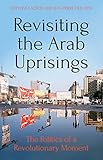Revisiting the Arab uprisings: the politics of a revolutionary moment
Material type: TextPublication details: Hurst & Co Publishers Ltd 2018 LondonDescription: x, 330p. With indexISBN:
TextPublication details: Hurst & Co Publishers Ltd 2018 LondonDescription: x, 330p. With indexISBN: - 9781849048873
- 320.961 R3
| Item type | Current library | Collection | Call number | Status | Date due | Barcode | Item holds | |
|---|---|---|---|---|---|---|---|---|
 Book
Book
|
Ahmedabad General Stacks | Non-fiction | 320.961 R3 (Browse shelf(Opens below)) | Available | 198981 |
Browsing Ahmedabad shelves, Shelving location: General Stacks, Collection: Non-fiction Close shelf browser (Hides shelf browser)
Since 2013, the Middle East has experienced a double trend of chaos and civil war, on the one hand, and the return of authoritarianism, on the other. That convergence has eclipsed the political transitions that occurred in the countries whose regimes were toppled in 2011, as if they were merely footnotes to a narrative that naturally led from an "Arab Spring" to an "Arab Winter". This volume aims at rehabilitating those transitions, by considering them as expressions of a "revolutionary moment" whose outcome was never pre-determined, but depended on the choices of a large range of actors. It brings together leading scholars of Arab politics to adopt a comparative approach to a few crucial aspects of those transitions: constitutional debates, the question of transitional justice, the evolution of civil-military relations, and the role of specific actors, both domestic and international.
There are no comments on this title.








